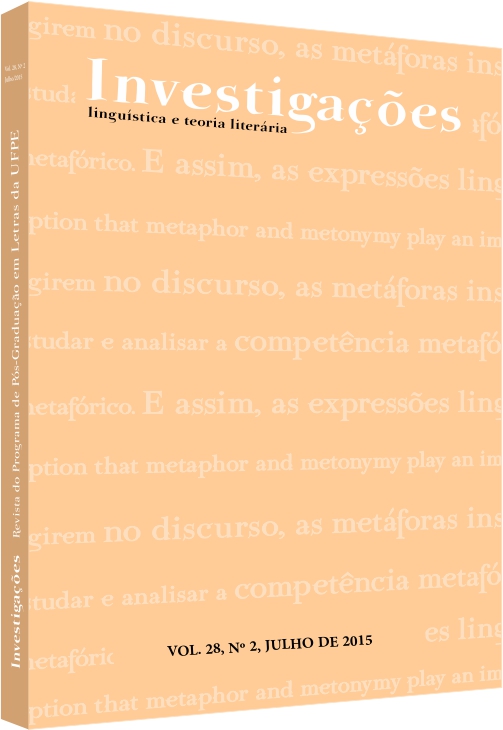Da linguística cognitiva à ciência social: 30 anos após “metáforas da vida cotidiana”, Michiel Leezenberg
Abstract
Nos trinta anos desde o surgimento de “Metáforas da vida cotidiana”, a linguística cognitiva desenvolveu-se em um ramo de investigações autônomo e próspero. Contatos interdisciplinares, entretanto, estão restritos aos estudos literários e às ciências cognitivas, e dificilmente estendem-se em direção às ciências sociais. Isto é ainda mais surpreendente quando, na antropologia da década de 1970, a metáfora foi vista como uma noção-chave para o estudo mais geral do simbolismo. Esta contribuição explora o ponto de vista linguístico-cognitivo de fatores sociais e culturais. Lakoff e Johnson parecem ambivalentes no que diz respeito à relação entre cultura e cognição; mas partilham da crença, elaborada em detalhes por Gibbs e Turner (2002), de que fatores culturais podem ser explicados em termos de processos cognitivos. Desta perspectiva decorrem dificuldades metodológicas e filosóficas. Metodologicamente, esta perspectiva assume que fatores culturais podem ser reduzidos a processos cognitivos: filosoficamente, resume-se à ênfase cartesiana na experiência interna para explicar fenômenos externos. Existem esforços anti-cartesianos tanto na filosofia contemporânea quanto em uma grande corrente da filosofia do Século XVIII. Esta última, em particular, enfatizou a importância da incorporação/corporificação e da metáfora na cognição. Enquanto alternativa, esboçarei de maneira mais consistente uma abordagem semiótica orientada para as práticas, que procede das práticas linguísticas para os processos cognitivos ao invés do contrário. Esta abordagem admite as práticas como irredutivelmente públicas e normativas; nesta, as assim chamadas ideologias linguísticas (Silverstein 1979) possuem papel constitutivo tanto nas práticas linguísticas quanto na estrutura da linguagem. Esta alternativa é construída tanto com base em desenvolvimentos recentes da antropologia linguística quanto nos trabalhos de Peirce e Bakhtin. Ela sugere um olhar diferente na relação entre cognição, linguagem e prática social daquele sugerido pela linguística cognitiva.References
AARSLEFF, H. Philosophy of language. In HAAKONSSEN, K. (ed.) The Cambridge Companion to Eighteenth-Century Philosophy: Vol. 1 (451-495), Cambridge, UK: Cambridge University Press. 2006.
CAMERON, L. & DEIGMAN, A. The emergence of metaphor in discourse. Applied Linguistics, 27: 671-690. 2006.
DE CONDILLAC, E.B. Essay on the Origins of Human Knowledge, AARSLEFF, H. (tr.), Cambridge, UK: Cambridge University Press. 2001 [1746].
CROFT, W. Toward a social cognitive linguistics. In EVANS, V. & POURCEL, S. (eds.) New Directions in Cognitive Linguistics (395-420). Amsterdam: John Benjamins. 2009.
DAVIDSON, D. On the very idea of a conceptual scheme. In DAVIDSON, D., Inquiries into Truth and Interpretation (183-198). Oxford: Oxford University Press. 1984 [1973].
FERNANDEZ, J. (ed.). Beyond Metaphor: The Theory of Tropes in Anthropology. Stanford, CA,
USA: Stanford University Press. 1991.
GEERTZ, C. Deep play: Notes on the Balinese cockfight. In GEERTZ, C., The Interpretation of Cultures (412-453). New York: Basic Books. 1973.
GIBBS, Jr., R.W. Taking metaphor out of our heads and putting it into the cultural world. In
STEEN, G.S. & GIBBS, Jr., R.W. (eds.), Metaphor in Cognitive Linguistics. Amsterdam: John
Benjamins. 1999.
HANKS, W.F. Language and Communicative Practice. Boulder, CO, USA: Westview Press. 1996.
LAKOFF, G. & JOHNSON, M. Metaphors We Live By. Chicago: University of Chicago Press. 1980.
LAKOFF, G. & JOHNSON, M. Philosophy in the Flesh: The Embodied Mind and its Challenge to Western Thought. New York: Basic Books. 1999.
LAKOFF, G. September 11, 2001. In KLEIN, M. & McINTYRE, A. (eds.), September 11: Contexts and Consequences. Berkeley CA, USA: Copy Central. 2001.
LAKOFF, G. Women, Fire and Dangerous Things: What Categories Reveal about the Mind. Chicago: University of Chicago Press. 1987.
LEEZENBERG, M. Contexts of Metaphor: Current Research in the Semantics-Pragmatics Interface, Vol. 7. Amsterdam: Elsevier Science. 2001.
LEEZENBERG, M. Metaphor and metalanguage: Towards a social practice account of figurative speech. In Camp, E. (ed.), Baltic International Yearbook of Cognition, Logic, and Communication, Vol. 3: A Figure Of Speech (1-24), Kansas: New Prairie Press. 2008.
LOCKE, J. An Essay Concerning Human Understanding, NIDDITICH, P.H. (ed.). Cambridge, UK: Cambridge University Press. 1975 [1689].
PUTNAM, H. Reason, Truth, and History. Cambridge, UK: Cambridge University Press. 1981.
REDDY, M. The conduit metaphor: A case of frame conflict in our language about language. In ORTONY, A. (ed.) Metaphor & Thought. Cambridge, UK: Cambridge University Press. 1979.
SELLARS, W. Empiricism and the philosophy of mind. In FEIGL, H. & SCRIVEN, M. (eds.), Minnesota Studies in the Philosophy of Science. Minneapolis, MN, USA: University of Minnesota Press. 1956.
TURNER, M. Cognitive Dimensions of Social Science. New York: Oxford University Press. 2002.
Downloads
Published
How to Cite
Issue
Section
License
Copyright (c) 2015 Erik Miletta Martins

This work is licensed under a Creative Commons Attribution 4.0 International License.
Authors who publish with Revista Investigações agree to the following terms:
Authors retain copyright and grant the journal right of first publication with the work simultaneously licensed under the Creative Commons Attribution 4.0 International (CC BY 4.0) license that allows others to share the work with an acknowledgement of the work's authorship and initial publication in this journal.
Authors are able to enter into separate, additional contractual arrangements for the non-exclusive distribution of the journal's published version of the work (e.g., post it to an institutional repository or publish it in a book), with an acknowledgement of its initial publication in this journal.
You are free to:
Share — copy and redistribute the material in any medium or format for any purpose, even commercially.
Adapt — remix, transform, and build upon the material for any purpose, even commercially.
The licensor cannot revoke these freedoms as long as you follow the license terms.
Under the following terms:
Attribution — You must give appropriate credit , provide a link to the license, and indicate if changes were made . You may do so in any reasonable manner, but not in any way that suggests the licensor endorses you or your use.
No additional restrictions — You may not apply legal terms or technological measures that legally restrict others from doing anything the license permits.

